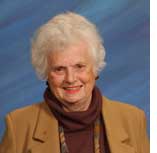|
By Natasha Josefowitz, Ph.D
 LA JOLLA, California—We are all composed of a variety of selves We have a parent self, a child self, a spouse self, a worker self, a leisure self, a friend self, and now a senior-citizen self, and in each of these selves, there are angry ones, compassionate ones, competitive, frightened, self-assured, and shy ones. LA JOLLA, California—We are all composed of a variety of selves We have a parent self, a child self, a spouse self, a worker self, a leisure self, a friend self, and now a senior-citizen self, and in each of these selves, there are angry ones, compassionate ones, competitive, frightened, self-assured, and shy ones.
I started thinking about all my own selves when I began a new phase of my life, that of moving into a retirement community where I had to reinvent myself into few new selves while losing several older ones. For instance, I lost the collector self by giving away the objects I had gathered over a lifetime but have gained a minimalist self with fewer possessions. I lost my housekeeper self, the one in charge of menus, grocery shopping, meal preparations, but gained a self free of those kinds of decisions. I lost a night driver self to a rider-in-a White-Sands-bus self. I have a community self that interacts with a lot of people as opposed to the loner self who sat quietly writing, although that one did not disappear altogether.
We are different selves with each of our different children; we need to be more of a disciplinarian with one more than with another. The boss at work self is different at the dinner table at home. One is decisive and commanding but would be inappropriate with a spouse. And if she did not leave that self at work, there would be problems in the marriage. Some selves permeate all the other selves. Like some people are uniformly compassionate or always carrying a chip on their shoulder. The same person can have a shy self in one situation and an assertive self in another.
The important thing to remember is that there is an inner observer in all of us who decides which self will be right for what situation. It is a little like a stage director who gives out roles to the actors in the scenes of life. Freud called it the ego. Robert
Go to the top of right column
|
|
Assogioli, who first described in 1920 the notion of various sub-personalities, called that director the transpersonal self.
Lee Lipsenthal gives workshops dealing with the various selves he calls psychosynthesis. One exercise is to answer the question “who are you?” and write down as many selves as come to mind. Then take four of them and give them a name. For example: the joker, the worrier, the enabler, the controller. Then take each one and make a list of the desirable and undesirable consequences of being that particular self. Once you become aware of the way each functions, you can consciously decide to give it more or less of a role. Some selves are stars and should be given more latitude; others are bit players but cause problems for you. The “you” who observes and decides and controls is, according to Lipsenthal, pure consciousness.
How often we have said or done something we later regret and wonder how we could have said that or acted that way. It is one of our selves who took it upon itself to act impulsively without prior approval of the observer/director. Part of our upbringing as well as part of civilization is learning to control that self who can be not only destructive to others, but destructive to itself. Again, Freud had a name for that impulsive self who acts on emotions and not on reason. He called it the Id.
Eric Berne had a different nomenclature for the selves. He categorized people into parent, child, and adult. Carl Jung wrote about “animus” the man inside every woman and “anima” the woman inside every man. Erving Polster wrote a book called: A Population of Selves: A Therapeutic Exploration of Personal Diversity. His book reconciles the seeming incompatibilities helping us to become the complete person we are meant to be.
I like the multiple selves idea as this does not limit us to a few categories but to an infinite number of players who change throughout our lifetime. Some, of course, remain constant, but what I find exciting is the possibility of shedding the unwanted selves and adding new ones and thus reinventing ourselves, forever growing wiser, forever becoming more conscious, forever letting our inner observer/director take charge.
|

